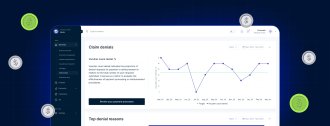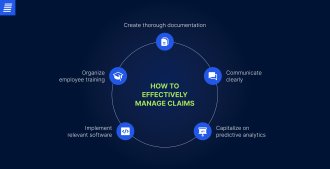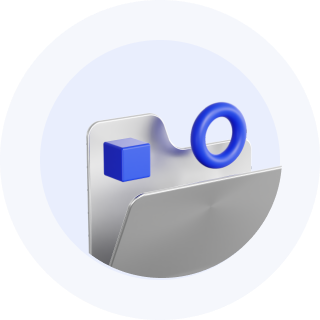
Contact us
Our team would love to hear from you.

Medical claims management software is used to automate and optimize the process of claims handling—from claims creation to closure. With this type of software:
The medical claims process begins when a healthcare provider creates a claim form with patient data, diagnosis and procedure codes, services delivered, and charges incurred.
The healthcare provider then files the claim form to a clearinghouse—an intermediary between claimants and insurance payers for claims verification—or directly to the payer.
After receiving the claim, the payer initiates the adjudication process, which involves carefully evaluating the validity of the claim based on specific insurance policies.
If the claim is accepted, the payer settles the amount to be paid by the claimant based on their health insurance plan and reimburses the remaining amount to the healthcare provider.
The payer then sends the explanation of benefits (EOB) statement to the patient, outlining the services provided and payments covered by both parties. The claim is officially closed.
If the payer has rejected/denied the claim because of missing data, invalid medical codes, or other problems, the healthcare company can rectify the errors and resubmit the claim.

“Claims information differs from payer to payer, which has caused healthcare providers a lot of trouble. Having a solution that collects, standardizes, and visualizes all valuable information paves the way for smart and data-driven decisions.”
Delivery Manager
Both ready-made and custom healthcare claims management solutions come equipped with multiple functionalities. The most popular features of bespoke medical claims management software include:
A web-based application designed to streamline customer claims processing for a company working in geographically dispersed markets.
To efficiently manage medical claims between claimants and insurance adjusters, healthcare organizations can:
If you want to eliminate mistakes in claims processing, avoid claims rejections and denials, and minimize reimbursement delays, implement health insurance claims management software. EffectiveSoft builds top-tier medical claims processing systems with features like claims intake, data analytics, reporting, and more.
It’s essential to offer training sessions to encourage healthcare professionals to use the new claims software. These sessions can help employees explore software features like claims creation and editing, coding compliance, rejection and denial management, and others to handle claims more efficiently and securely.
Predictive analytics plays a crucial role in claims management. By combining machine learning (ML) algorithms, statistical models, and historical and current data, predictive analytics helps healthcare providers flag fraudulent claims early in the process, improve claims accuracy, reduce claims processing time, and more.
Maintaining an accurate record of all medical claims, including confidential patient information, diagnosis codes, and treatment details is crucial. By creating effective documentation, healthcare providers can accelerate the assessment of claims validity, resulting in faster claims settlement and resolution.
Transparent communication inspires trust in patients and ensures their claims are managed properly. To establish an effective connection, inform patients about the claims processing steps, use patient-friendly communication channels, provide timely updates on claims status, and follow legal communication guidelines.


Achieving clean claims is a goal for any medical facility, as adjusters process these claims faster, ensuring timely reimbursement. Custom medical claims management tools incorporating coding compliance, proactive rejection and denial management, and other essential features can help healthcare providers implement a faster and more accurate claims management process, ultimately achieving higher clean claims rates.
Business Analyst
Our business analysts (BAs) gather, analyze, and document the healthcare provider’s goals, pain points, and business and product requirements for the final product, emphasizing clinical utilization, the target audience, and other key factors. They also estimate the resources, time frames, and expenses required for the project, establish important milestones, and identify key deliverables.
Next, our solution architects create a software architecture blueprint and define the necessary technical stack. Our designers then build a low-fidelity wireframe followed by an interactive mockup and high-fidelity prototype, all of which contribute to the final user interface/user experience (UI/UX) design. Additionally, they design user-friendly interfaces with elements like layout, navigation, color patterns, and more.
Based on the verified product prototype, we build the necessary components and functionality for the healthcare claims management software, using back-end and front-end technologies and adhering to Agile and DevOps best practices. To create a cohesive system of software components and continuously improve code quality, we conduct peer code reviews and unit testing at this stage.
Our quality assurance (QA) team then performs manual and automated testing of all functional and non-functional aspects of the final product. To ensure the software meets the established requirements, our QA engineers evaluate its integration and system capabilities, security, performance, compatibility, and more. They also identify any glitches and quickly fix them.
After comprehensive testing, the glitch-free medical claims management software is ready for deployment in the production environment and official market release. To ensure the success of the software and high adoption rates, we combine various deployment strategies like continuous deployment (CD), ramped deployment, canary deployment, rolling deployment, and more.
Once the final solution is available to the intended audience, we continuously monitor its performance, address emerging security, operational, and compliance issues, and implement the necessary improvements based on user feedback. We also provide the required updates and upgrades, ensuring the software delivers uninterrupted service 24/7 for all parties.
Сustom medical claims management solutions significantly optimize healthcare claims management. By connecting healthcare providers, claimants, and insurance payers, these solutions significantly reduce administrative burdens, promoting efficiency and financial stability for all parties involved. Are you tired of convoluted claims processing, high claims rejections and denials due to manual data entry mistakes, and last-minute reimbursement? With EffectiveSoft’s support you can resolve these issues. Contact us now for a superior software solution that makes claims management accurate, fast, and compliant.

The main challenges in healthcare claims processing include fraud, compliance issues, data management, security, and inflated patient expectations. To easily overcome these hurdles, use EffectiveSoft’s custom medical claims management software services.
Turning to EffectiveSoft for medical claims management software development is the ideal solution. We have been in healthcare IT for over 21 years, delivering high-quality software solutions for healthcare businesses worldwide. We have a deep understanding of healthcare challenges, including those related to claims management, and have effectively addressed them. Other reasons companies choose us include our commitment to quality, unwavering focus on compliance and security, use of advanced tools and technologies, unique approach to each client and their pain points, empathy, and more.
The cost of developing a medical claims management tool depends on the overall complexity of the end product, features incorporated, customization levels, integration capabilities, and more. Do you want an exact quote for your project? Fill out the contact form, and we will reach out immediately.
Yes, medical claims management software solutions can integrate with EHRs/EMRs, practice management systems (PMSs), billing tools, insurance clearinghouse software, and more.
Can’t find the answer you are looking for?
Contact us and we will get in touch with you shortly.
Our team would love to hear from you.
Fill out the form, and we’ve got you covered.
What happens next?
San Diego, California
4445 Eastgate Mall, Suite 200
92121, 1-800-288-9659
San Francisco, California
50 California St #1500
94111, 1-800-288-9659
Pittsburgh, Pennsylvania
One Oxford Centre, 500 Grant St Suite 2900
15219, 1-800-288-9659
Durham, North Carolina
RTP Meridian, 2530 Meridian Pkwy Suite 300
27713, 1-800-288-9659
San Jose, Costa Rica
C. 118B, Trejos Montealegre
10203, 1-800-288-9659